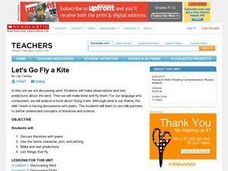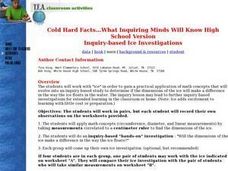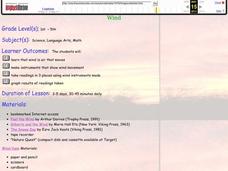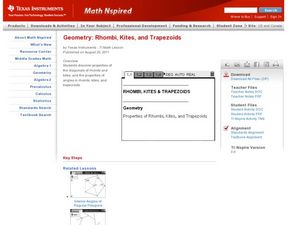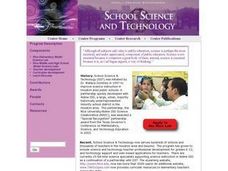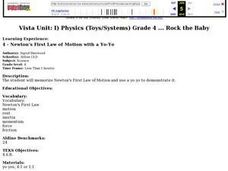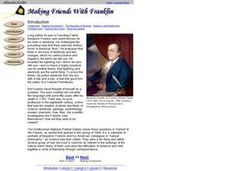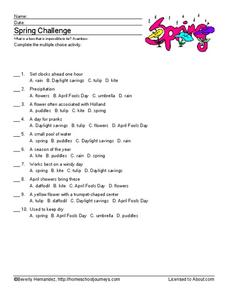MENSA Education & Research Foundation
Hurricanes
Learn the ins and outs of hurricanes through a series of lessons answering, "What is a hurricane? How does it travel? How is one formed, measured, and named?" Information is presented through informative text and images, while...
Curated OER
What Makes a Kite Fly?
Ninth graders compare the nature of forces of gravity, lift, thrust, and drag. They select proper materials for making a kite and attach a proper tail. Students interpret and summarize the observations made during the flight of the kites.
Curated OER
Science: Let's Fly a Kite!
Students make observations about the wind and develop predictions to test with kites. The lesson's Language Arts component invloves communication of concepts with peers. On their kite flying day, students discuss how the wind and air...
Curated OER
Let's Go Fly a Kite
Students complete activities to learn about wind. In this wind lesson, students study wind in an open field and use a kite to complete their observations. Students make a series of drawings to show how they flew their kites and explain...
Curated OER
Making Kites
Students engage in the study of kites and focus upon the evaluation and designs invovled. They conduct research into the different types of designs and use the information in order to create unique project designs. The drawings are...
Curated OER
Cold Hard Facts...What Inquiring Minds Will Know
Young scholars work with "ice" in order to gain a practical application of math concepts that evolve into an inquiry-based study. They determine if the dimensions of the ice make a difference in the way the ice floats in the water.
Curated OER
Aviation, Aeronautics and Aerodynamics
Students investigate the physics of flight through various experiments. In this physics lesson, students construct different flying objects. They explain the dynamics that make these object fly.
Curated OER
Wind
Students make a wind vane, anemometer, wind spiral, and wind streamer to calculate wind movement. In this wind lesson plan, students test each of their wind instruments, and graph the results of the wind speed in different locations.
Curated OER
Changes in Motion: Push & Pull
In this changes in motion worksheet, students view the concept of pulling and pushing an object, decide whether 10 statements or examples of push or pull and circle their multiple choice answers. Students draw a picture of themselves...
Curated OER
Rhombi, Kites, and Trapezoids
Learners identify the number of diagonals for each polygon. In this geometry lesson, students identify the polygons based on their diagonals and the way it intersect. They create visuals using the navigator to see the changes in the shapes.
Curated OER
Newton's First Law of Motion with a Glider
Third graders examine, analyze, study and memorize Newton's First Law of Motion utilizing a glider to demonstrate the process. They state, sing, draw or enact an example/illustration of Newton's First Law of Motion in front of their...
Curated OER
Newton's First Law of Motion with a Yo-Yo
Fourth graders are introduced to, summarize, analyze and memorize Newton's First Law of Motion and experiment demonstrating the theory with a yo-yo. They state, sing, draw, or enact Newton's First Law of Motion several times and with...
Teach Engineering
Take Off with Paper Airplanes
Let's go fly a kite ... oops, a paper airplane! The 13th segment in an aviation unit of 22 relates the parts of an airplane to paper airplanes. Pupils learn the functions of the control surfaces of a plane to really make their knowledge...
Curated OER
Aviation
Students explore aviation. In this physics instructional activity, students work cooperatively to construct kites, paper airplanes, and paper plate discs. Students launch the object created and observe characteristics and length of...
Curated OER
So Many Inventions!
Students listen to a teacher read aloud of two books about Chinese inventions. They examine some items that were invented by Chinese inventors such as dominoes, an abacus, a silk scarf, or kite. Next, they determine how a compass works...
Curated OER
Forces: Worksheet 2
In this force and motion worksheet, students answer multiple choice, true/false and fill in the blank questions about force and motion.
Curated OER
Water Web-- Weather: Something We Talk a Lot About But Can't Change
In this science learning exercise, students study weather prediction by reading and completing activities in this 8 page newsletter. Students classify clouds, study weather prediction instruments, learn weather proverbs and signs and...
Curated OER
See the Wind
Students explore alternative energy sources. For this wind energy lesson, students will investigate the difference in the speed and smoothness of wind at different altitudes above earth. Students will use kites, helium balloons,...
Curated OER
History of Flight Timeline
Students research flight timelines and record their findings. In this flight lesson plan, students brainstorm with a KWL chart on what they want to learn about the history of flight. They then make a timeline of their findings, and...
Curated OER
Making Friends With Franklin
Students will reflect upon the life of Benjamin Franklin in order to understand his place in history. Emphasis is placed upon the development and contributions he made to modern science inquiry. The learner uses readings to do various...
Curated OER
Spring Vocabulary
In this spring vocabulary skills instructional activity, students match the 10 season-related terms in the word bank to the appropriate definitions.
Curated OER
Wind
Students complete activities to study wind intensity. In this wind study lesson, students discuss wind speed and direction. Students then build a kite and windsock to help them study wind intensity. Students learn to use a wind meter for...
Curated OER
Teaching the Toki Kaku Dako
Students complete various readings and decorating, constructing, and flying a kite. They analyze how the parts of a system to together. Students comprehend the concept of area.
Curated OER
Sticky Tongue
Third graders make inquiry about the adaptations that help a frog to survive in its environment. They identify the adaptations and define how they work. They also research the idea of how species have common characteristics.


